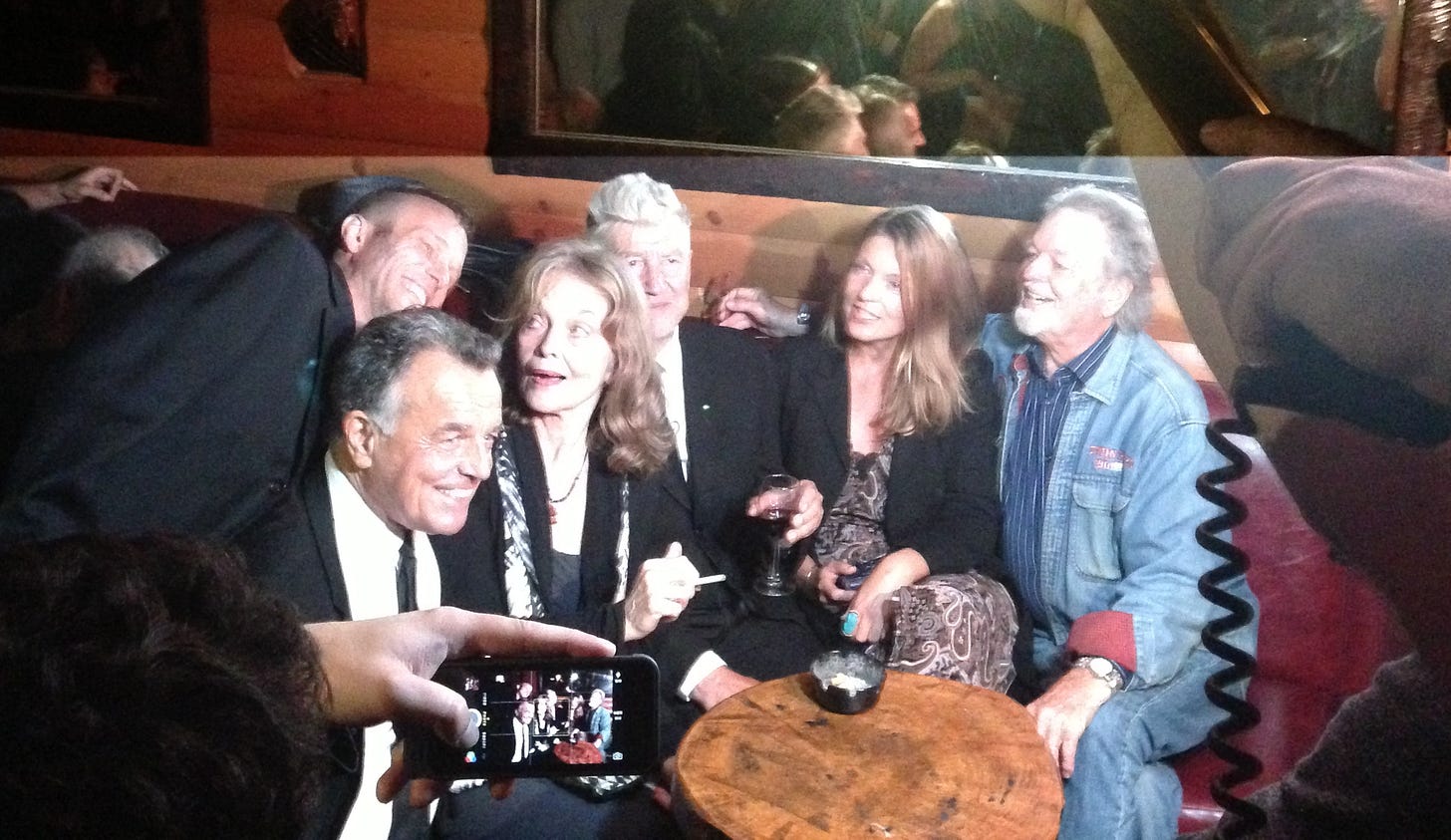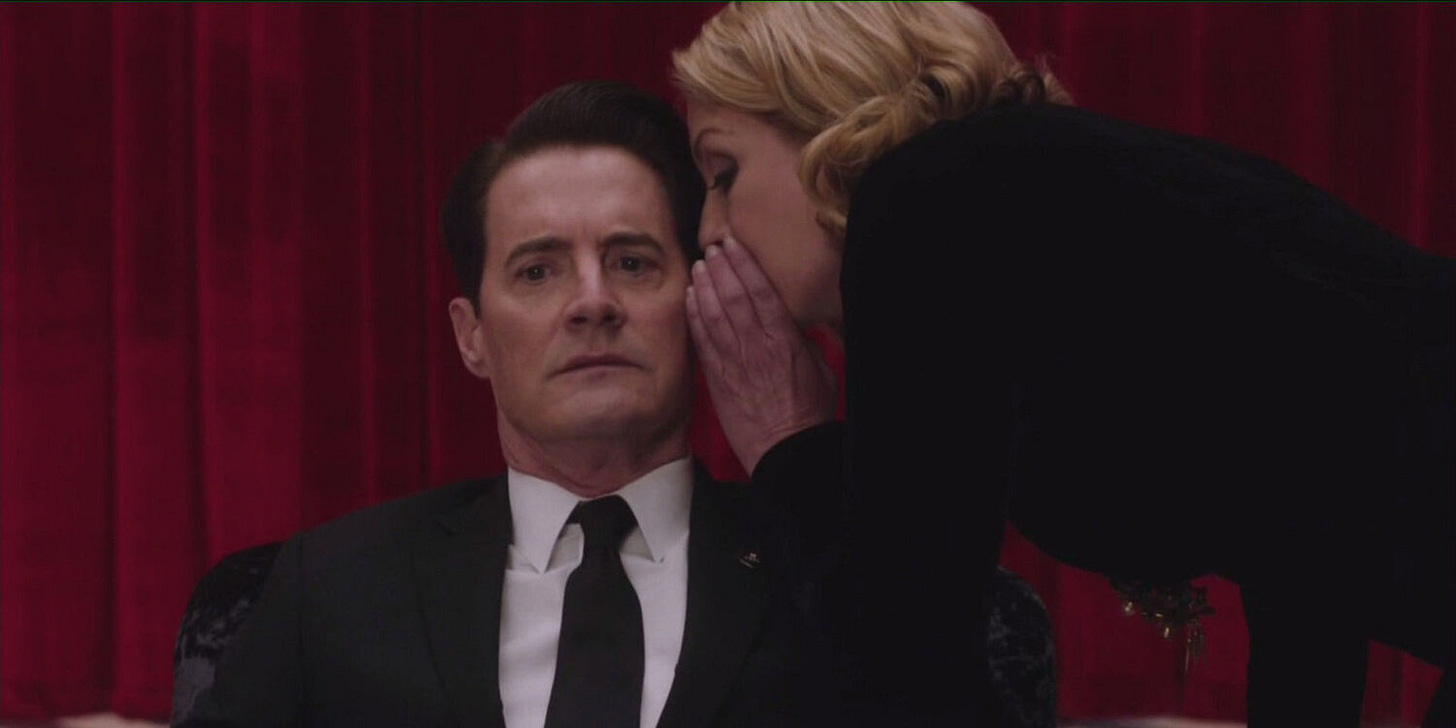David Lynch's Death is a Reminder of the Power of Twin Peaks
The brilliantly unique filmmaker made one hell of an impact when he turned to the small screen.
Some celebrity deaths hit harder than others, and I know I’m not alone in feeling quite a sense of loss hearing the news that David Lynch passed away. His movie are an amazing accomplishment - truly unique, fascinating and, yes, very odd creations that always felt deeply personal and heartfelt, even when you were baffled by them upon first viewing. I’m a huge fan of Lynch films like Blue Velvet, Lost Highway and Mulholland Drive, but his work that resonated with me the most, by far, was the one that brought him to television for the first time, Twin Peaks.
As a child of the 80s, there were plenty of TV shows I loved and made sure to see each week growing up, but Twin Peaks, which celebrates its 35th anniversary this year, was the first time I felt genuine obsession included with that love - but, you know, the good kind of obsession! The “I am so excited by what I’m seeing and I can’t wait to see more of it!” kind.
It had a strong core murder mystery element, sure, and lots of twists and turns that intermingled a detective story with soap opera elements. But it was also so off-kilter and quirky in such an intriguing and appealing way. I would be very remiss to not mention Lynch’s co-creator here, Mark Frost, and as many have noted before, Frost bringing his impressive TV writing experience, working on shows like Hill Street Blues, was crucial to making Twin Peaks work and to hooking in its audience. Frost’s skills offered Lynch the ability to lure in mainstream viewers in a way his films rarely would, spotlighting the humor and lovable characters… before something truly creepy or unsettling would occur to suddenly shift everything into genuine horror.
Eventually, Twin Peaks would reveal itself to be more horror than we might ever have imagined - as in, supernatural-based horror, with characters, occurrences, and other planes of reality that traveled far beyond what anyone would have suspected when they watched the fantastic pilot about a murder in a small town.
There were so many Twin Peaks felt groundbreaking for television when it first aired, and that willingness to make such huge shifts in tone and, ultimately, even in genre was one of them. Most TV shows tended to follow a certain formula - even the few at the time with more serialized storylines followed their own set parameters and rules. Yet Twin Peaks basically said “There are no rules” and was willing to shift wildly as a result, letting the audience laugh with a silly and endearing Andy and Lucy scene one minute, then put on their detective cap the next as Agent Cooper and Sheriff Truman uncovered an exciting new clue, and then freak the hell out when Killer Bob made his next terrifying appearance.
Lynch only directed a handful of episodes of Twin Peaks’ original run, and while you could feel his influence over the entire series, when he was guiding a particular installment, it stood out. I remember watching the Season 2 premiere with a group of fellow Twin Peaks superfan classmates, which culminated with Ronette Pulaski awakening from her coma and seeing more of her memories of god damn nightmare fuel Killer Bob attacking - which resulted in all of us having the appropriate freak out, shouting at the TV included. And the Lynch-directed Season 2 finale was an hell of a way for the original show to conclude, as Agent Cooper traveled to the dreaded Black Lodge and even more surreal and powerful images filled the screen, at the same time setting the stage for where Twin Peaks projects would go in the future.
That included the phenomenal prequel film, Twin Peaks: Fire Walk With Me. Focusing on the last week of Laura Palmer’s life, the movie stripped away much of the silly-fun elements of Twin Peaks for a more focused, tragic and haunting look at the girl whose murder set the series in motion. It’s an incredible movie that has only grown in impact as time has gone on, and more have come to appreciate it, and my personal favorite Lynch film. Yes, it’s a prequel that functions, from afar, as a “franchise-extension,” but it’s in a way only Lynch could have provided. It’s ultimately not about filling in story gaps or over-explaining anything — not that Lynch ever felt the need to over-explain — but more about truly humanizing the girl who was both part of Twin Peaks’ center yet also offscreen for much of the series.
The existence of 2017’s revival series, Twin Peaks: The Return, still feels like a miracle. In an age where so many old movies got years or decades-later legacy sequels or revivals — including the disparate likes of Karate Kid, Wet Hot American Summer and Evil Dead — the idea of Twin Peaks ever coming back still felt incredibly far-fetched. And yet it actually happened! And it was such a trip in such a great way.
Though Lynch and Frost were still writing together, The Return — which was all directed by Lynch, unlike the original series — definitely feels even more set to Lynch’s specific wavelength. But the older, even more experimental Lynch, who felt even more dreamlike with his approach to the stories he told. He adored the world and characters of Twin Peaks, that much was clear, but he was now a different kind of filmmaker, with a show even less confined to any TV show rules. It was no doubt confounding for some who wanted more of what the original Twin Peaks offered in terms of its somewhat dependable elements, but it was also deeply compelling on its own terms. It was an extension and continuation of Twin Peaks, sure, but one that not only reflected the passage of time through the age of its cast and characters, but through the overall shift in perspective from its creators. And it allowed for something as amazing as the acclaimed “Part 8” episode, which told a 1950s-set, black and white horror story that was riveting, gorgeous, confusing, and fulfilling - a combination few but David Lynch could ever hope to achieve.
I never got to interview David Lynch, but I did ask him a question during an appearance he made at the TCA press tour in 2017 to promote Twin Peaks: The Return - one in which he was characteristically funny, charming, and utterly unwilling to give much in the way of clear, specific answers about a revival series none of us had seen yet. I asked him a pretty boring question — and one that probably felt a bit annoying, given how long it took for The Return to happen — which was whether we might get even more Twin Peaks after The Return. And I also got one of Lynch’s more straightforward answers of the day, as he told me "Right now there’s no plans for more" but added "You never know.”
Obviously, with Lynch’s death, it feels like not only will there not be more Twin Peaks but that there shouldn’t be more Twin Peaks. And honestly, as someone who loved The Return, once it was over, it didn’t feel like we needed more after the experience it offered and the journey it took us on - though obviously I would have welcomed more had Lynch and Frost decided to do so. The revival series didn’t offer clean, easy answers or wrap ups for lingering questions, but why would it? That was never Lynch’s style and it was even less his style by 2017. It left us with a lot to chew on and plenty to ponder in terms of potential meanings about a show and a world that kept evolving, start to finish - and now ends with a harrowing and haunting scream.

I was doing a rewatch of The Return awhile back that got set aside in the midst of a million press screeners and such, but as luck would have it, I left off right before “Part 8.” And now I’m both sad about the reason for this reminder nudge yet excited to jump back in and witness one hell of a piece of art.











I remember watching the original series on Hulu or Netflix or something, probably in part inspired by your (and Matt's) recommendation back in the IGN days. I remember liking it but it wasn't until I got to Fire Walk With Me that I fell in love with the world Lynch and Frost created. You touched on this, but it feels a bit weird to say that one of my favorite movies is a prequel movie based on TV show, but it really is.
I loved The Return as well, stuff like the episode you highlighted and Wally Brando (“May the road rise up to meet your wheels”) were amazing. But the moment that has stuck with me the most is the final scene. I remember just sitting there in silence long after the credits and the haunting score ended. After all these years, on random walks or when I'm cleaning or listening to a song I'll hear: "What year is this?" and then a boom and then a scream.
On whim, I bought myself a Blu-ray set of the original series and The Return (I already had the Criterion Collection release of Fire Walk With Me) for Christmas. I've never rewatched the series but I think it's about time to experience it all again